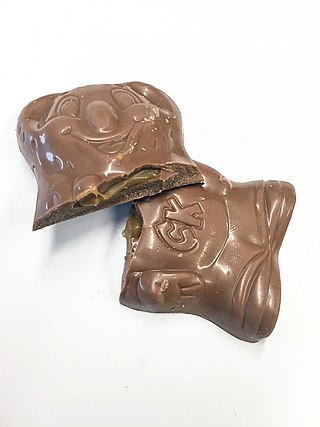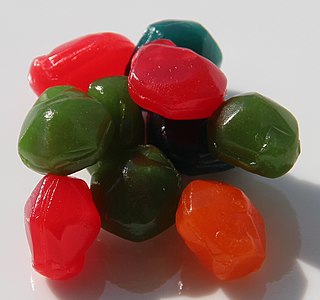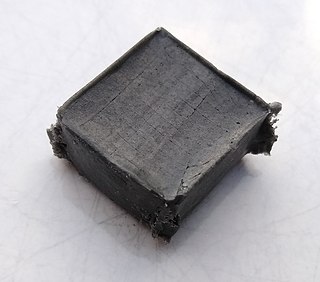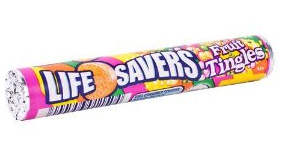
A carbohydrate is a biomolecule consisting of carbon (C), hydrogen (H) and oxygen (O) atoms, usually with a hydrogen–oxygen atom ratio of 2:1 and thus with the empirical formula Cm(H2O)n, which does not mean the H has covalent bonds with O. However, not all carbohydrates conform to this precise stoichiometric definition, nor are all chemicals that do conform to this definition automatically classified as carbohydrates.

The calorie is a unit of energy that originated from the caloric theory of heat. The large calorie, food calorie, dietary calorie, or kilogram calorie is defined as the amount of heat needed to raise the temperature of one liter of water by one degree Celsius. The small calorie or gram calorie is defined as the amount of heat needed to cause the same increase in one milliliter of water. Thus, 1 large calorie is equal to 1000 small calories.
A nutrient is a substance used by an organism to survive, grow and reproduce. The requirement for dietary nutrient intake applies to animals, plants, fungi and protists. Nutrients can be incorporated into cells for metabolic purposes or excreted by cells to create non-cellular structures such as hair, scales, feathers, or exoskeletons. Some nutrients can be metabolically converted into smaller molecules in the process of releasing energy such as for carbohydrates, lipids, proteins and fermentation products leading to end-products of water and carbon dioxide. All organisms require water. Essential nutrients for animals are the energy sources, some of the amino acids that are combined to create proteins, a subset of fatty acids, vitamins and certain minerals. Plants require more diverse minerals absorbed through roots, plus carbon dioxide and oxygen absorbed through leaves. Fungi live on dead or living organic matter and meet nutrient needs from their host.
Food energy is chemical energy that animals derive from their food to sustain their metabolism, including their muscular activity.

Tic Tac is a brand of small, hard mint manufactured by the Italian company Ferrero. They were first produced in 1969 and are now available in a variety of flavors in over 100 countries.
Basal metabolic rate (BMR) is the rate of energy expenditure per unit time by endothermic animals at rest. It is reported in energy units per unit time ranging from watt (joule/second) to ml O2/min or joule per hour per kg body mass J/(h·kg). Proper measurement requires a strict set of criteria to be met. These criteria include being in a physically and psychologically undisturbed state and being in a thermally neutral environment while in the post-absorptive state (i.e., not actively digesting food). In bradymetabolic animals, such as fish and reptiles, the equivalent term standard metabolic rate (SMR) applies. It follows the same criteria as BMR, but requires the documentation of the temperature at which the metabolic rate was measured. This makes BMR a variant of standard metabolic rate measurement that excludes the temperature data, a practice that has led to problems in defining "standard" rates of metabolism for many mammals.
White Knight is a brand of chocolate-coated, chewy, mint-flavoured confectionery bar sold in Australia. Originally produced by Hoadley's Chocolates it was later manufactured by Nestlé Australia. The packaging is blue and white and features a picture of a knight on a horse. Its slogan is 'Mighty Mint Chew'. The product was discontinued in 2016.

Therapeutic foods are foods designed for specific, usually nutritional, therapeutic purposes as a form of dietary supplement. The primary examples of therapeutic foods are used for emergency feeding of malnourished children or to supplement the diets of persons with special nutrition requirements, such as the elderly.
Fatty acid metabolism consists of various metabolic processes involving or closely related to fatty acids, a family of molecules classified within the lipid macronutrient category. These processes can mainly be divided into (1) catabolic processes that generate energy and (2) anabolic processes where they serve as building blocks for other compounds.
Specific energy or massic energy is energy per unit mass. It is also sometimes called gravimetric energy density, which is not to be confused with energy density, which is defined as energy per unit volume. It is used to quantify, for example, stored heat and other thermodynamic properties of substances such as specific internal energy, specific enthalpy, specific Gibbs free energy, and specific Helmholtz free energy. It may also be used for the kinetic energy or potential energy of a body. Specific energy is an intensive property, whereas energy and mass are extensive properties.

Caramello Koala is a brand of chocolate treat currently manufactured by Cadbury Australia. It consists of a chocolate cartoon koala with a caramel centre.

Fruit Gushers are a Betty Crocker-branded fruit snack introduced in 1991. They are soft and chewy with a fruity-juice center.

Isomaltulose is a disaccharide carbohydrate composed of glucose and fructose. It is naturally present in honey and sugarcane extracts and is also produced industrially from table sugar (sucrose) and used as a sugar alternative.
The Atwater system, named after Wilbur Olin Atwater, or derivatives of this system are used for the calculation of the available energy of foods. The system was developed largely from the experimental studies of Atwater and his colleagues in the later part of the 19th century and the early years of the 20th at Wesleyan University in Middletown, Connecticut. Its use has frequently been the cause of dispute, but few alternatives have been proposed. As with the calculation of protein from total nitrogen, the Atwater system is a convention and its limitations can be seen in its derivation.
Starvation response in animals is a set of adaptive biochemical and physiological changes, triggered by lack of food or extreme weight loss, in which the body seeks to conserve energy by reducing metabolic rate and/or non-resting energy expenditure to prolong survival and preserve body fat and lean mass.

Black Jack is a type of "aniseed flavour chew" according to its packaging. It is a chewy confectionery manufactured under Valeo Confectionery's Barratt brand in UK and Spain. Introduced in the 1920s by Trebor, the wrapper originally showed gollywogs on it.

Rowntree's Randoms are a jelly sweet produced by Nestlé under its Rowntree's brand. The sweet was launched in the UK on 18 May 2009.

Barratt is a confectionery brand in the United Kingdom, known for products including DipDab, Refreshers, Sherbet Fountain, Fruit Salad, Black Jack and Wham.

Fruit Tingles is a brand of confectionery originating in Australia. They are a chalky-textured, multicoloured, disc-shaped, fruit flavoured lolly. Standard packages are 34g foil wrapped sleeves with an outer multicoloured paper wrapper, and contain 16 pieces of randomly distributed flavours. Four-pack packaging containing four rolls is common for supermarket sales.











